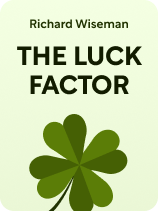

This article is an excerpt from the Shortform book guide to "The Luck Factor" by Richard Wiseman. Shortform has the world's best summaries and analyses of books you should be reading.
Like this article? Sign up for a free trial here.
Why do extroverts have more lucky moments than introverts? Why should you relax into luck?
Because extroverts tend to put themselves in more new situations than introverts, they’re more likely to encounter “lucky” moments. Rather than being a form of magic, luck often comes from putting yourself into situations where positive outcomes are more likely to happen.
Here’s a deeper look into extroverts and luck from the book The Luck Factor.
Seizing Lucky Moments
Lucky people recognize potentially lucky moments and immediately take action when they happen. This form of luck isn’t magic, but rather stems from certain people’s psychological makeup—they tend to be extroverts who are open to new experiences.
(Shortform note: Despite Wiseman’s observation, not every opportunity may be worth taking. In The Success Principles, Jack Canfield warns that if you follow too many mediocre opportunities, they’ll consume so much time and energy that you can’t take better chances when they come along. Canfield writes that it’s important to say no to “lucky moments” that don’t support your overarching goals. He suggests writing down a list of opportunities that only get in your way, as well as a list that divides your “good” opportunities from your “great” ones. This process requires engaging your analytical skills more than following your intuition, as opposed to what Wiseman says lucky people do, but Canfield says it’s a more effective path to achieving a long-term goal.)
Wiseman writes that extroverts, by their nature, meet many people and put energy into maintaining long-term relationships. The extensive social network an extrovert creates dramatically increases their chances of beneficial chance meetings and connections. Therefore, if you’re looking for a job, a romantic partner, or just a good plumber to work on your house, and you have a wide network of connections, your odds are much higher of “lucking into” someone who can help you. The more contacts you have, the better your odds—extroverts create luck through simple mathematics.
(Shortform note: This particular point of Wiseman’s may sound disheartening to those who don’t find interacting with others easy, but it doesn’t have to be. In Taking the Work Out of Networking, Karen Wickre writes that even introverts have innate qualities they can use to establish and broaden connections. For instance, introverts are adept listeners and observers who are good at understanding other people’s feelings. As a result, an introvert can form deeper connections than a more overtly outgoing “people person.” However, introverts generally need to make a more concerted effort to maintain and grow their network of connections, part of which could certainly be to believe you’ll have good luck when meeting other people.)
Relaxing Into Luck
However large your circle, you have to be open to grabbing chances when they come, and a relaxed approach to life can help with that. Wiseman’s research shows that lucky people tend to have a relaxed attitude and an openness to new experiences. People with lower anxiety are more likely to view chance occurrences with less suspicion, seeing them as opportunities instead of dangers. Likewise, people who seek out new experiences expose themselves to a broader range of opportunities than people who stay in safe, familiar patterns. In short, lucky people’s relaxed approach to life lets them capitalize on opportunities that others overlook. Being “lucky” in this sense simply means staying open to the world around you.
(Shortform note: One exemplar of Wiseman’s point was award-winning physicist Richard Feynman, whose autobiography Surely You’re Joking, Mr. Feynman! says hardly a word about his scientific achievements and instead highlights the crazy adventures he had while seeking new experiences, such as playing drums with a Brazilian marching band or learning how to draw on a dare from a colleague. Feynman never concerned himself with luck, but he lived in pursuit of happiness, which Wiseman equates to being much the same thing. For Feynman, the secret to happiness was not feeling responsible for the world while viewing it with wide-eyed curiosity, both of which increase your chances for the kind of luck that Wiseman describes.)

———End of Preview———
Like what you just read? Read the rest of the world's best book summary and analysis of Richard Wiseman's "The Luck Factor" at Shortform.
Here's what you'll find in our full The Luck Factor summary:
- The unconscious methods lucky people use
- The benefits of trusting your intuitive hunches
- The scientific explanation as to whether or not luck is real






